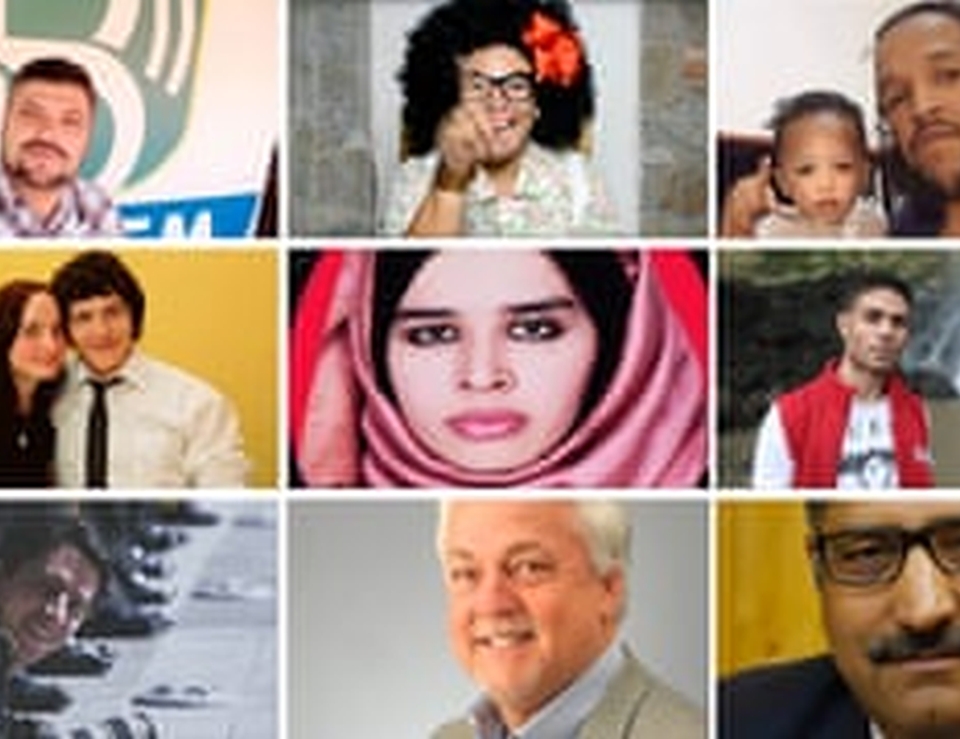
'Killed for speaking the truth': tributes to nine journalists murdered in 2018
Over 30 journalists – including Jamal Khashoggi – have been murdered so far this year. With the help of colleagues and relatives, or in their own words and pictures, we pay tribute to some of them here.
by Aamna Mohdin and Bibi van der Zee
Maharram Durrani, 1990–30 April 2018
A trainee producer and presenter at Radio Azadi in Afghanistan, Durrani was one of at least nine journalists killed by a suicide bomb while making her way to work in Kabul.
Malali Bashir, a journalist, TV and video producer for RFE/RL’s Afghan service and a colleague of Durrani: “The bomb was a deliberate attack on journalists. As they lost their lives one by one, the whole office was in shock. I can’t explain the situation we were in. We didn’t stop the broadcast. Everything was live ... We were being professional, we were giving the facts, we were being balanced, but still, it was emotional because you lost a colleague that was in contact with you yesterday.
“Maharram had been hired to work on a weekly programme focused on women’s rights and women’s issues. She was the main financial supporter of her family. She told her father she would be like a son, she would be the breadwinner. Her father said she refused to get married because she wanted to keep supporting her family financially. He said she was very courageous and brave.
“She was a soft-spoken, very modest person but with great potential as a journalist. We don’t have many females on the ground, especially women who are very interested in covering issues related to women. This is a tragedy. She was still in training ... she didn’t even finish the first programme.”
Jefferson Pureza Lopes: 17 November 1979–17 January 2018
A producer and radio presenter for Rádio Beria Rio FM in Brazil, Lopes fearlessly criticised local politicians and highlighted corruption. He was shot dead in his living room. No one has been charged with his murder.
On 19 November 2017, a few months before he was killed, the radio station at which Lopes worked was attacked and burnt down. Lopes uploaded a Facebook video showing the wreckage and insisted the station would soon be back on air.
Ibrahim al-Munjar: 1992-17 May 2018
The correspondent for Syrian news website Sy24 was killed outside his house by an unknown group in May.
Ghaith Hammour, the founder of Sy24 and al-Munjar’s editor: “Ibrahim was one of our stringers in the south. He did everything. We don’t have the luxury to have people in front of the camera and behind the camera. When he did videos for us, he was the cameraman, the storyteller and the story editor. He was the one who got the story. He’d tell us how he’d do it and we’d help him to make it better.
“One particularly great story he did was about the children living in Daraa who, at the start of the revolution, did some graffiti calling for Assad to go. Some of these kids were tortured and arrested. In 2018, Ibrahim followed up with one of these kids, now a man. It was one of the best stories he ever did.
“He’d had several threats from Isis and from the regime. He moved house several times, but unfortunately he was killed in front of his house.
“Ibrahim was so quiet, but he had a great eye and developed himself over the years and became one of the best cameramen in the area. When he died, our whole office was devastated. We don’t know who killed him. We can’t be sure, it’s Syria. And Syria is the most dangerous place in the world to be a journalist.”
Ján Kuciak: 17 May 1990–21 February 2018
In February, the bodies of Kuciak, an investigative journalist for the Slovakian news website Aktuality.sk, and his fiancee Martina Kušnírová were found in their apartment: both had been shot, with no signs of a struggle.
Pavla Holcová, a Czech journalist who worked alongside Kuciak on his last investigation: “He was a village man in the best sense of that word. He was modest, he didn’t get into fights. He was a silent guy, but the type of man who wants to know how the world works. He loved digging and going through documents and making the mosaic of the information come into focus.
“We worked together on the Panama Papers and the Paradise Papers but, for the 18 months leading up to his death, we’d been exploring a huge story about possible links between the Slovak prime minister and a branch of the Italian mafia, the ‘Ndrangheta.
“Jan and his fiancee were planning to get married … His editor called me the morning after their bodies were found and told me I needed to get police protection. We spoke again a day later and agreed that we had to get the story out as quickly as possible, and a coalition of journalists worked on the piece and did incredible work to release it across a number of outlets.
“I didn’t feel much when the Slovak prime minister resigned soon afterwards. My job is to provide information, not to take down politicians. Journalism is facing a kind of crisis around the world. But maybe soon we will hit the bottom, and then we can come up with a better kind of journalism, for the 21st century.”
Story first appeared in theguardian.com on 5th Dec 2018
STORY BY

Mumbai Press Club
Editor
Article posted on 08/12/2018
- Share This Story On:




